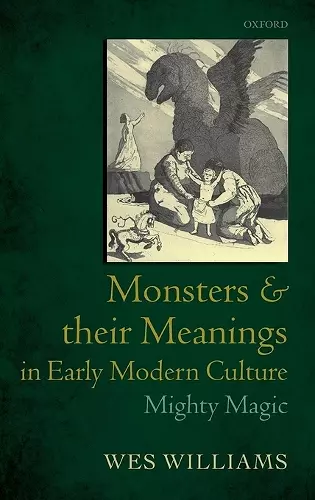Monsters and their Meanings in Early Modern Culture
Mighty Magic
Format:Hardback
Publisher:Oxford University Press
Published:26th May '11
Currently unavailable, and unfortunately no date known when it will be back

To call something 'monstrueux' in the mid-sixteenth century is, more often than not, to wonder at its enormous size: it is to call to mind something like a whale. By the late seventeenth 'monstrueux' is more likely to denote hidden intentions, unspoken desires. Several shifts are at work in this word history, and in what Othello calls the 'mighty magic' of monsters; these shifts can be described in a number of ways. The clearest, and most compelling, is the translation or migration of the monstrous from natural history to moral philosophy, from descriptions of creatures found in the external world to the drama of human motivation, of sexual and political identity. This interdisciplinary study of monsters and their meanings advances by way of a series of close readings supported by the exploration of a wide range of texts and images, from many diverse fields, which all concern themselves with illicit coupling, unarranged marriages, generic hybridity, and the politics of monstrosity. Engaging with recent, influential accounts of monstrosity - from literary critical work (Huet, Greenblatt, Thomson Burnett, Hampton), to histories of science and 'bio-politics' (Wilson, Céard, Foucault, Daston and Park, Agamben) - it focusses on the ways in which monsters give particular force, colour, and shape to the imagination; the image at its centre is the triangulated picture of Andromeda, Perseus and the monster, approaching. The centre of the book's gravity is French culture, but it also explores Shakespeare, and Italian, German, and Latin culture, as well as the ways in which the monstrous tales and images of Antiquity were revived across the period, and survive into our own times.
This is a book born of long and deep reflection on its subjects' writings (especially Montaigne's), and attends to both the tiny stitches of an essay, play or fiction, and to the larger design. As Williams maps the linkages and the meanings to which they lead, he can listen with a tuner's sensitivity to the internal rhymes in a line of Racine and to their equivalents in Ted Hughes's rendering, or, zooming out, can give a sweeping overview of the poliical context. His methods persuasively combine material historicity with some inspiration from "universal" deconstructionism and psychoanalysis; the results are rich and layered, and show how barren theoretical purism can be. * Marina Warner, Times Literary Supplement *
- Winner of Shortlisted for the 2012 R.H. Gapper Book Prize.
ISBN: 9780199577026
Dimensions: 238mm x 160mm x 26mm
Weight: 689g
362 pages